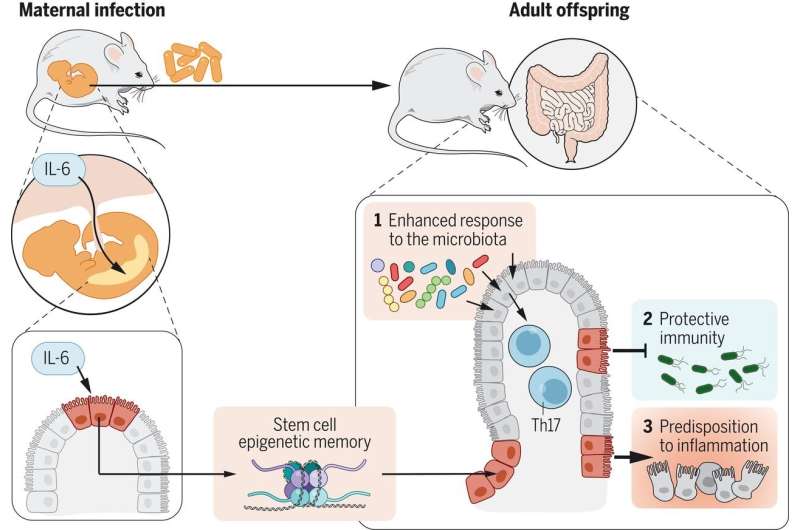August 27, 2021 report
Prenatal maternal infections promote tissue-specific immunity and inflammation in mice offspring

A team of researchers at the U.S. National Institutes of Health has found infections in pregnant mice promoted tissue-specific immunity and also inflammation in their offspring. In their paper published in the journal Science, the group describes experiments in which they infected pregnant mice with gut bacteria. Mohammed Amir and Melody Zeng with Cornell University have published a Perspective piece in the same journal issue outlining the work done by the team at NIH.
Prior research has shown that activation of the immune system in pregnant women due to a response to an infection can sometimes lead to neurodevelopmental defects in their babies. In this new effort, the researchers wondered if infections during pregnancy could also confer some lifelong benefits to offspring. To find out, they infected pregnant lab mice with Yersinia pseudotuberculosis, a common foodborne pathogen. In most cases, symptoms of such infections are mild gut irritation. They then tested both the mother and fetuses for infection and for levels of an immune response.
Initial testing of the pregnant mice and their fetuses showed the pregnant mice to be infected while the fetuses were not. Both had elevated levels of intestinal T helper 17 (Th17) cells, however, evidence of an immune response to the infection was seen in the mother. The mothers also experienced abnormally high levels of cytokine interleukin-6 (IL-6), which is known to be an inflammation instigator.
The researchers allowed the mothers to give birth and then monitored the offspring as they grew to adulthood. They found that the mice that had experienced elevated levels of Th17 while still in the womb showed greater resistance against Y. pseudotuberculosis as adults. But those same mice were also found to be more likely to develop intestinal disorders such as colitis. Taking a closer look, they found that when the mice were still in the womb, they were exposed to the high levels of cytokine interleukin-6 produced by their mother and that led to epigenetic changes in their intestinal epithelial stem cells, which, the researchers suggest, is why they were more likely to develop inflammation problems later on in life.
More information: Ai Ing Lim et al, Prenatal maternal infection promotes tissue-specific immunity and inflammation in offspring, Science (2021). DOI: 10.1126/science.abf3002
Mohammed Amir et al, Immune imprinting in utero, Science (2021). DOI: 10.1126/science.abl3631
© 2021 Science X Network



















